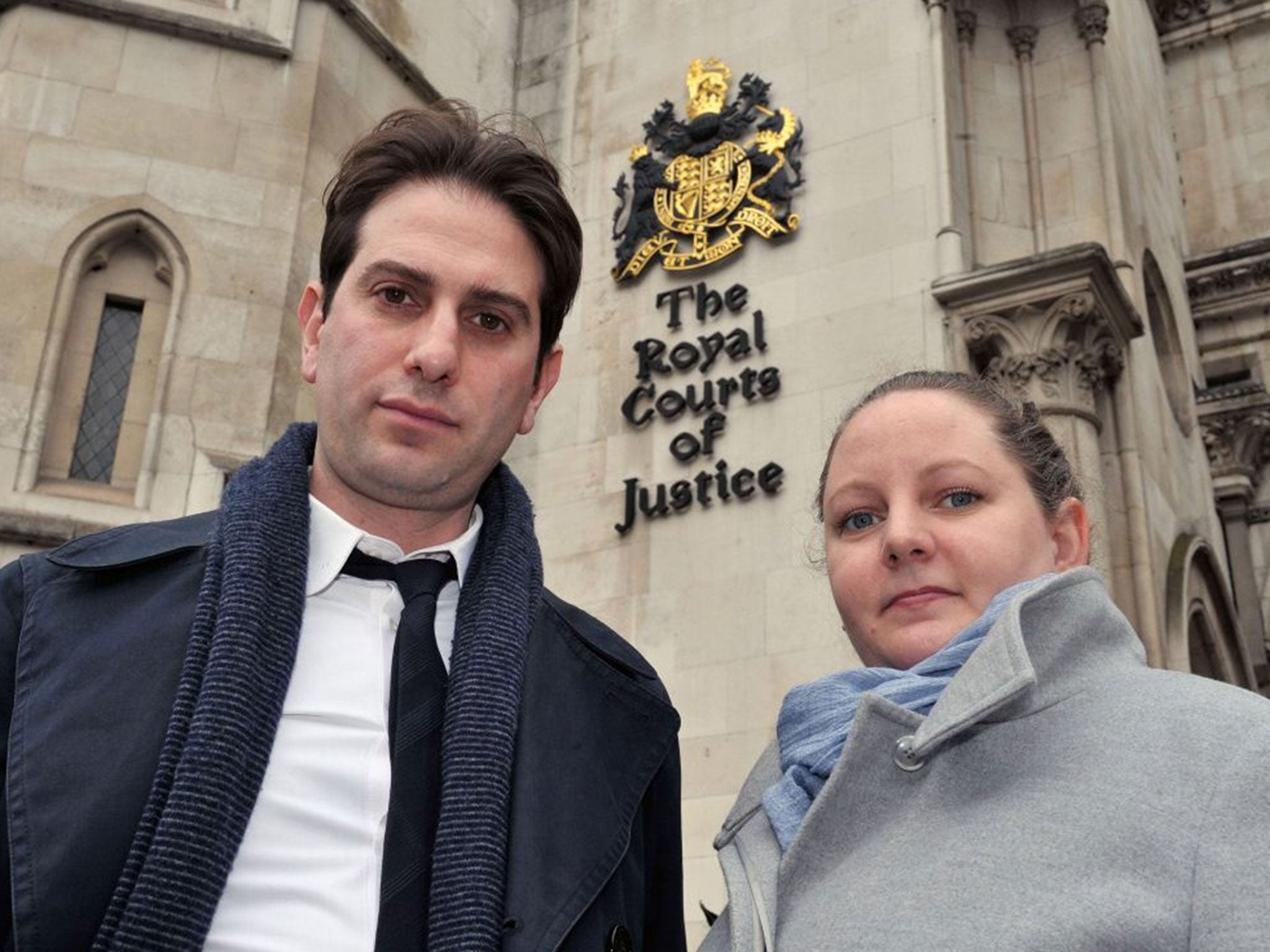Heterosexual couple wanting to enter into a civil partnership lose court challenge
Charles Keidan: 'It is time for Parliament to demonstrate its commitment to creating a level playing field for all citizens by opening up civil partnerships to same-sex and opposite-sex couples alike'

A heterosexual couple wanting to enter into a civil partnership rather than get married have lost a legal challenge at the High Court.
Rebecca Steinfeld and Charles Keidan, from Hammersmith, west London, argued that they are being discriminated against by not being able to become civil partners – a legally recognised relationship only same-sex couples are eligible to enter under the Civil Partnership Act 2004.
Dr Steinfeld, 34, and Mr Keidan, 39 - academics who have been in a committed relationship since 2010 and have a baby – claimed that the Government’s position on civil partnerships is “incompatible with equality law”.
Mrs Justice Andrews, sitting in London’s High Court, today dismissed their judicial review action.
But, the couple were given permission to take their case to the Court of Appeal because it raises issues of “wider importance”.
Coincidentally, a private members’ bill aiming to amend the 2004 Act and extend civil partnerships to opposite-sex couples today had its second reading in the House of Commons.
After the ruling, Dr Steinfeld said: “We made this claim because the UK Government is barring us, and many thousands of opposite-sex couples like us, from the choice of forming a civil partnership, and we want this to change.”
Her partner added: “We don't think there is sufficient justification for stopping us or other opposite-sex couples from forming civil partnerships. Unfortunately, the judge has concluded otherwise.”
Mr Keidan said it was “now time for Parliament to demonstrate its commitment to creating a level playing field for all its citizens by opening up civil partnerships to same-sex and opposite-sex couples alike”.
The couple said they would pursue their case at the Court of Appeal on behalf of themselves and the 36,000 people who had signed their petition “calling for civil partnership equality”.
In pictures: Anti-gay marriage protests in Houses of Parliament
Show all 7The 2004 act requires civil partners to be “two people of the same sex”, while the Marriage (Same Sex Couples) Act of 2013 made it legal for two people of the same sex to also marry.
The couple argued that the inconsistency between the law on civil partnerships and marriage in this way was incompatible with the Human Rights Act.
Explaining her ruling, Mrs Justice Andrews said she did “not accept” that the law was incompatible with Articles 14 and 8 of the European Convention of Human Rights (ECHR), which is incorporated into UK law through the Human Rights Act.
The articles prohibit discrimination and guarantee respect for the right to a family life.
The judge said that the law on civil partnerships had “not become incompatible” with the ECHR “just because same-sex couples now have two routes to achieving legal recognition of their relationship by the state and opposite-sex couples continue to have only one”.
She said: “By deciding to wait until it is in a better position to evaluate the impact of the 2013 Act on civil partnerships before taking any legislative steps, against a background where there is no consensus either domestically or within Europe as to the appropriate course to take, the Government is acting well within the ambit of discretion afforded to it with regard to the regulation of social matters.
“Opposite-sex couples are not disadvantaged by the hiatus, because they can achieve exactly the same recognition of their relationship and the same rights, benefits and protections by getting married, as they always could.”
The judge said that Dr Steinfeld and Mr Keidan had “deep-rooted and genuine ideological objections to the institution of marriage, based upon what they consider to be its historically patriarchal nature”.
She added: “The claimants feel that it is unfair that a route to state recognition of their relationship which is open to a same-sex couple with exactly the same deeply held objections to marriage as theirs remains unavailable to them simply because they are heterosexual, despite the fact that same-sex couples who wish to marry can now do so.
“No doubt there will be many people who sympathise with that point of view. However, unfairness does not necessarily equate to incompatibility with the Convention.”
Additional reporting by the Press Association
Subscribe to Independent Premium to bookmark this article
Want to bookmark your favourite articles and stories to read or reference later? Start your Independent Premium subscription today.

Join our commenting forum
Join thought-provoking conversations, follow other Independent readers and see their replies